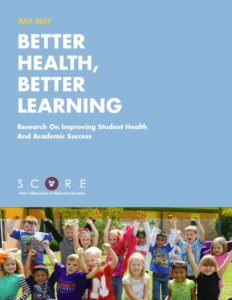“There is an undeniable connection between education and health. That’s why now, more than ever, we need a public education system producing more high school graduates who are better prepared for a career or college and life.” These words were written by Senator Bill Frist, MD, the founder and chairman of SCORE, in 2011. They remain true today.
Recognizing the undeniable link between a student’s health and his or her ability to learn, as well as the higher quality of life enjoyed by people with higher education levels, SCORE has spent the last year looking into research on these issues and partnering with NashvilleHealth, also founded by Senator Frist, to hold the Better Health, Better Learning statewide summit next month.
In advance of the summit, which will bring together policymakers and leaders from K-12, higher education, public health, and philanthropic communities, SCORE recently released a new research brief, Better Health, Better Learning: Research On Improving Student Health And Academic Success. To inform this brief, members of our team read through years of research on the connections between student health, educational outcomes, and adult health tied to educational attainment. Based on our review, we identify for key findings:
• Physical activity, nutrition, and overall well-being can have a profound effect on student achievement.
• High-quality education and academic achievement are associated with improved health outcomes later in life.
• Mental and emotional health are critical for student success.
• Investing in student health leads to short- and long-term economic benefits.
 This is a critical time to address the health needs of Tennessee’s students. Compared to their peers nationally, young Tennesseans are less likely to eat nutritious foods on a regular basis, more likely to have children of their own as teenagers, and more likely to smoke, experience emotional, behavioral, or developmental challenges, and more likely to have asthma. During the 2015-16 school year, more than 226,000 students in Tennessee public schools had a chronic illness or disability diagnosis. That’s more than one-in-five students in our state’s schools. Many students also confront trauma outside of school, ranging from having a parent incarcerated to substance abuse or violence in the home. All of these conditions and experiences can negatively affect a student’s ability to reach his full potential at school.
This is a critical time to address the health needs of Tennessee’s students. Compared to their peers nationally, young Tennesseans are less likely to eat nutritious foods on a regular basis, more likely to have children of their own as teenagers, and more likely to smoke, experience emotional, behavioral, or developmental challenges, and more likely to have asthma. During the 2015-16 school year, more than 226,000 students in Tennessee public schools had a chronic illness or disability diagnosis. That’s more than one-in-five students in our state’s schools. Many students also confront trauma outside of school, ranging from having a parent incarcerated to substance abuse or violence in the home. All of these conditions and experiences can negatively affect a student’s ability to reach his full potential at school.
Although all students in Tennessee need support for their physical, emotional, and mental well-being, data from our state show stark disparities across race/ethnicity, household income, and geographic location. African American parents in Tennessee are more than twice as likely as white parents to report their children are not in excellent or very good health; Hispanic/Latino parents are nearly four times as likely. Rural students—that’s one-in-three students in Tennessee—have higher rates of obesity and slightly higher rates of mental health challenges than their more urban peers. Statewide, the rate of children living in poverty increased over the years 2010-14 from 13 percent to 16 percent. We know that in rural and urban communities alike, low-income students are more likely to have chronic health problems.
Poor health conditions can lead students to have higher rates of absence, and the more instructional time they miss, the harder it is for them to catch up. Data from the Tennessee Department of Education show “almost 45,000, or 10 percent, of Tennessee K-3 students missed at least a month of school days during the 2014-15 school year.” That year, only about 40 percent of chronically absent third-graders reached proficiency in math, compared to more than 60 percent of students who were not chronically absent. In reading, only 44 percent of students who were not chronically absent reached proficiency in reading. But that rate was just 28 percent for chronically absent peers.
The costs to student achievement and to the state compel a collective effort across the public education, public health, business, and philanthropic sectors to focus on improving student health and student achievement. Innovative approaches like using video-conferencing technology can help expand access to health professionals for students in rural areas. Investments in resources for parents and families, as well as to ensure all students have access to healthy foods, can be life-changing for students in rural and urban communities alike. The work to address and improve the health and achievement of Tennessee students is as needed and urgent as ever. Research can guide the way, but action must be taken to ensure the best future for our kids.
